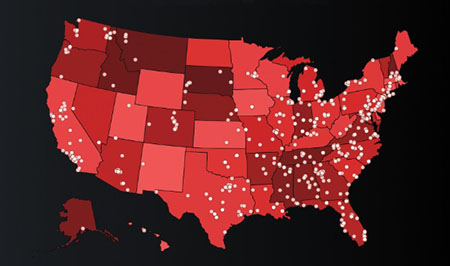by WorldTribune Staff, May 12, 2023
In a first, a U.S. District Court judge in Alabama has allowed a defamation lawsuit against the Southern Poverty Law Center (SPLC) to proceed.
Anti-illegal immigration activist D.A. King sued the SPLC after the Georgia-based group King founded, the Dustin Inman Society, was labeled in 2018 as an “anti-immigration hate group” by the SPLC.

Last month, Judge W. Keith Watkins denied the SPLC’s motion to dismiss the lawsuit. The judge’s ruling allows the lawsuit to proceed to the discovery phase, in which the society can demand the SPLC hand over documents to prove its case and the SPLC can demand society documents to defend itself.
Tyler O’Neil, author of “Making Hate Pay,” an examination of the SPLC, called the judge’s ruling “monumental.”
“This is the very first defamation lawsuit specifically challenging the SPLC’s ‘hate group’ accusation to make it to discovery,” O’Neil said. “Conservatives who have faced routine defamation may finally get some justice, and the American people may finally see behind the curtain how the SPLC runs its ‘hate group’ scam.”
The SPLC has very deep pockets, with an endowment of more than $500 million. A racial discrimination and sexual harassment scandal in 2019 led the SPLC to fire its co-founder after a former employee came forward, calling the SPLC’s “hate” accusations a “highly profitable scam.”
In 2018, the SPLC branded the Dustin Inman Society an “anti-immigrant hate group.” The SPLC had previously stated in 2011 that it did not consider the society a “hate group.”
The society, named after a 16-year-old Georgia boy killed in a 2000 car crash caused by an illegal immigrant, aims to combat illegal immigration.
“After telling the Associated Press in 2011 that we were not a ‘hate group,’ the SPLC changed their mind and made us an ‘anti-immigrant hate group’ within days of their registering as active lobbyists against pro-enforcement, immigration-related legislation here in the Georgia Capitol,” King told The Daily Signal.
King claimed the SPLC’s “goal was clearly to paint us as the extremists and to marginalize us in the eyes of state lawmakers and the media. That effort was largely successful.”
Washington Times reporter Stephen Dinan noted: “The SPLC holds itself out as the ultimate arbiter of domestic hate groups, and those on the political left widely cite its list as evidence that some groups deserve to be silenced. The FBI has cited the SPLC’s work in its decisions about whom to target — including a recent memo from the FBI’s Richmond, Virginia, office urging agents to keep an eye on those who ascribe to ‘radical traditionalist Catholic ideology.’ ”
SPLC attorneys have claimed in court filings that the First Amendment protects opinions, so the organization cannot be held liable for defamation.
“SPLC’s anti-immigrant hate group designation is not capable of being proved false, but is an opinion expressed as part of a political debate,” the SPLC argued.
The SPLC questioned whether there can be a fixed definition of hate or being “anti-immigrant.” If there is no definition, then there is no standard to judge the SPLC’s argument as false.
But Judge Watkins, appointed to the bench by President George W. Bush, said that doesn’t wash, at least for the anti-immigrant label. He said there is a fixed definition of “immigrant” in federal law, so it’s easy to figure out what anti-immigrant means. That should be clear to “SPLC’s attorneys, who encompass some of the brightest legal minds in the country,” he wrote.
In an email to The Washington Times, King said he and the Dustin Inman Society already have achieved something with the lawsuit by getting the SPLC to acknowledge that its vaunted hate list is a statement of opinion, not fact.
“They have already told a federal court that their ‘hate group’ designation doesn’t mean the designation is factual. We hope to allow the SPLC to expose themselves in court,” he said. “We want an apology and a retraction. We hope one of the violent SPLC followers doesn’t get to us before the trial.”
In 2012, a mentally ill gunman inspired by the SPLC’s list attacked the Washington office of the Family Research Council, wounding the building manager who wrestled the man to the ground.
Membership . . . . Intelligence . . . . Publish
